Rendered at 07:58:13 05/17/25
1*2*4cm Finished Brass Seal. Inscription:墨香 [mò xiāng]: The fragrance of ink
$25.00
Ships from
China

Shipping options
FREE to United States
Ships from
China

Offer policy
OBO - Seller accepts offers on this item.
Details
Return policy
Purchase protection
Payment options
PayPal accepted
PayPal Credit accepted
Venmo accepted
PayPal, MasterCard, Visa, Discover, and American Express accepted
Maestro accepted
Amazon Pay accepted
Nuvei accepted
Shipping options
FREE to United States
Ships from
China

Offer policy
OBO - Seller accepts offers on this item.
Details
Return policy
Purchase protection
Payment options
PayPal accepted
PayPal Credit accepted
Venmo accepted
PayPal, MasterCard, Visa, Discover, and American Express accepted
Maestro accepted
Amazon Pay accepted
Nuvei accepted
Item traits
| Category: | |
|---|---|
| Quantity Available: |
Only one in stock, order soon |
| Condition: |
Unspecified by seller, may be new. |
| Country/Region of Manufacture: |
China |
| Handmade: |
No |
| Material: |
Brass |
Listing details
| Shipping discount: |
No combined shipping offered |
|---|---|
| Posted for sale: |
May 14 |
| Item number: |
1742942196 |
Item description
Dear friends,
Welcome to my online seal shop! I am Kong from the hometown of Confucius, and I am delighted to recommend this set of seal to you.
This is a finished seal, which is made of brass. Its size is about 1*2*4 centimeters, and the content carved on it is ?? [mò xi?ng], which means the fragrance of ink.
?About Me?
I am Kong Dezhou, born in the historic city of Qufu, the birthplace of Confucius, China's greatest educator and philosopher, more than 2575 years ago. As a 77th-generation collateral descendant of Confucius, I am deeply honored to carry forward the cultural legacy of my ancestor. My workshop is located on the pedestrian street east of the Confucius Temple, where I have the pleasure of welcoming numerous domestic and international tourists each year.
With the flourishing economy, I have expanded my craft into the digital realm and, with the help of friends, established this online store. Here, you can view my personal photographs, my shop, my carving works and honors, as well as a television interview about me.
To celebrate the launch of my online store, I will be releasing a series of seals, each available at a very favorable price. I warmly invite you to explore and purchase these unique pieces. My hometown, a small city with a long history and profound cultural heritage, holds a special place in my heart. Confucius once said, "It is a joy to have friends come from afar." I sincerely welcome you to my hometown, Qufu. Thank you very much.
Kong Dezhou: Befriending Stone, Touching Hearts
(By Shandong's Neighboring Culture, 2018-01-17)
Not long ago, a friend and I visited the Speechless Seal Store in Qufu, the hometown of Confucius. It was there that I first met Mr. Kong Dezhou, a 33-year-old folk artist with an air of quiet elegance. As he introduced the materials and characteristics of his stone seals, his confidence and expertise shone through. His explanations were clear, delivered in a calm and unhurried tone. When I asked to see examples of his work, he presented a photo album filled with thousands of imprints from recent years. Each piece showcased a unique style, ranging from seal script and regular script to official script, as well as seals featuring names, idioms, and intricate drawings.
As part of our editorial mission, we conducted an in-depth interview with Mr. Kong, exchanging ideas and gaining insight into his craft. Through our conversation, we witnessed his dedication to hard work, his ingenuity, and his relentless pursuit of excellence, all of which are reflected in the exceptional service he provides to his customers.
Mr. Kong’s journey began under the mentorship of Kong Fan Hua, a renowned folk artist in Qufu. From a young age, he internalized his teacher’s wisdom: "To carve a seal is akin to being a person—only with a virtuous character can one create something truly remarkable." After parting ways with his first teacher, Mr. Kong continued to refine his skills under the guidance of Han Tian Heng, a celebrated seal engraver, and Tian Yun Zhang, a master calligrapher. He also pursued formal education through online courses, completing a correspondence program in seal engraving and calligraphy at Qufu Normal University, where he graduated with distinction.
With 16 years of experience in the seal-cutting industry, Mr. Kong has meticulously replicated over 1,000 Han Dynasty seals. Today, he is renowned for his ability to carve seals with delicate yet firm strokes and bold, expressive white spaces. To date, he has crafted more than 50,000 seals for tourists from around the globe, earning widespread acclaim. His works have been featured in prestigious exhibitions, including the First Modern Seal Carving Art Exhibition in North China, the Third Seal Carving Art Exhibition in Shandong Province, and the Jining Seal Carving Art Exhibition. His achievements have also been highlighted in publications such as Qilu Evening News and Jining Today News, and he was honored as one of the first batch of Outstanding Folk Artists in Jining.
Mr. Kong’s accolades include the second prize in the 2nd National Calligraphy and Seal Carving Competition, the third prize in the 3rd National Calligraphy and Seal Carving Competition, and the first prize in the inaugural "Cultural Holy Land, Calligraphy Jining" TV Calligraphy and Seal Carving Competition.
Reflecting on his 16-year journey, Mr. Kong shared his heartfelt thoughts: "Qufu is a city rich in history and culture, welcoming over 300,000 domestic and international tourists annually. Our unique cultural products enhance the travel experience for visitors. The local government places great emphasis on the development of cultural goods, particularly seal carving, which has gained global recognition. The annual sales of these products now reach hundreds of millions of yuan."
"My workshop is situated on the street between the Confucius Mansion and the Confucius Temple," Mr. Kong explained. "During peak tourist seasons, my apprentices and I often work up to 15 hours a day to meet customer demand. No matter how busy we are, I always remember my teacher’s teachings and ensure that each seal is meticulously crafted. Every piece must be a masterpiece, and every customer must leave satisfied."
As Confucius once said, "Virtue is never solitary; it always attracts neighbors." Through over a decade of dedication, Mr. Kong Dezhou has turned his store into a gold-standard brand, earning the trust and praise of customers both at home and abroad. "I’ve already opened a Taobao store in China," Mr. Kong shared. "Next year, with the help of friends, I plan to launch an international online store to bring these seals to a global audience. My goal isn’t just to make a profit but to share and preserve China’s rich traditional culture."
When asked about his career aspirations, Mr. Kong spoke with passion: "My ideal is to befriend stone and leave a lasting impression in people’s hearts. Each small seal embodies China’s enduring cultural heritage and conveys the benevolence and righteousness of Confucianism. Over the past 16 years, I’ve carved an average of ten seals a day. If I continue for another 30 years, my works will exceed 160,000 pieces. This number represents the cultural enjoyment I hope to bring to over 100,000 people. This is the source of my happiness and the true value of my life."
As he spoke, Mr. Kong raised his index finger. I couldn’t help but notice the thick calluses covering his fingertips and the slight deformation of his finger from years of holding the carving chisel. It was a poignant reminder of the dedication and sacrifice behind his craft.
The Dragon Vein of China, Establishing Trust through Seals
——A Profile of the Renowned Seal Engraver Kong Dezhou
(Author: Shi Feng, a calligraphy and painting critic, June 16, 2021)
The history of Chinese calligraphy began with the art of seal engraving on stone. These seals are like a "dragon vein" that runs through the fabric of Chinese culture. Contemporary seal engraver Kong Dezhou is a torchbearer of this "dragon vein." Through decades of diligent study and creative work, he has achieved remarkable success in the field of seal engraving, becoming a representative figure in promoting traditional aesthetic values. His works are widely recognized in the land of Qilu (Shandong Province) and enjoy a prestigious reputation across the nation. Many celebrities, businesspeople, and political figures from both China and abroad eagerly seek his seals, treasuring them as precious artifacts. His seal engraving not only holds significant cultural influence domestically but is also highly esteemed internationally.
In addition to creating seals, Kong Dezhou serves as a seal engraving instructor at the Qufu Academy of Chinese Studies and the Yanzi Center for Chinese Classical Studies. He not only teaches students the techniques of seal engraving but also emphasizes the cultivation of moral character, advocating the principle of "cultivating both virtue and skill." Under his guidance, many students have not only improved their technical skills but also enhanced their personal character. It can be said that Kong Dezhou is not just a seal engraving artist but also a scholar who spreads Chinese culture through teaching. His students are spread far and wide, making significant contributions to the inheritance of Chinese culture.
Kong Dezhou's works cover a wide range of subjects and styles. Whether it is the solemn and grand official seals or the fluid and free designs, he handles them with ease. He is also highly skilled in the use of Zhu Wen (positive characters, red in color) and Bai Wen (negative characters, white in color), blending strength and softness to showcase his profound artistic skills. His seal engraving techniques are rooted in deep research into ancient seal engraving art, especially his profound understanding of Han Dynasty seals. He has also received guidance from renowned Shanghai seal engraving masters such as Han Tianheng and Tian Yunzhang, further refining his skills.
Kong Dezhou's success is not accidental but the result of decades of relentless accumulation. He has copied tens of thousands of Han Dynasty seals and created tens of thousands of his own, amassing a wealth of experience. His portrait seals are particularly vivid and lifelike, demonstrating his deep skill and relentless pursuit of art. It can be said that each of his seals embodies years of hard work and dedication.
Kong Dezhou's seal engraving is not only an artistic expression but also a symbol of the "trust" spirit in Chinese culture. Through his seal engraving art, he promotes the culture of integrity of the Chinese nation, becoming a spokesperson for the "culture of trust." His works are seen as symbols of national trust and hold significant cultural value.
FAQ:
Question 1: What type of characters do you use for carving?
Answer: I primarily use seal script (??), a font that originated in China’s Qin Dynasty over 2,000 years ago. It differs significantly from modern simplified Chinese characters in form. While I can engrave other fonts, the choice may be limited by the material and size of the seal. Please contact me in advance to discuss your preferences.
Question 2: Can I see the design of the seal before carving?
Answer: I can send you a photo of the finished seal imprint for your approval before shipping. If you’d like a preview of the design before carving begins, I can provide a simple sketch. However, please note that the final engraved seal may differ slightly from the sketch due to the intricacies of the carving process.
Question 3: When I stamp my name on paper, will the characters be red or white?
Answer: Typically, I engrave names in red, known as Yang Wen (??), where the characters stand out against a white background. However, depending on the material or character style, white fonts (Yin Wen, ??) may be used. If you have a preference, please let me know in advance. Interestingly, during the Han Dynasty, most seals featured white fonts.
Question 4: How do you translate my name into Chinese characters?
Answer: Chinese translations for most foreign names already exist, as they have been standardized by institutions like China’s Ministry of Foreign Affairs and Xinhua News Agency. These translations are typically phonetic, using Chinese characters that match the pronunciation of your name.
Question 5: Can you create a personalized Chinese name for me?
Answer: Absolutely! If you’d like a unique Chinese name, please share some details about yourself, such as your occupation, personality, or hobbies. I’ll combine these with the pronunciation of your name to create a meaningful and personalized Chinese name. This service is free of charge.
Question 6: Can you engrave my English name (or other languages, logos, or portraits) alongside my Chinese name?
Answer: Yes, but this depends on the complexity of the design and the size of the seal. Please contact me in advance to discuss your requirements. Note that additional customization may incur extra fees.
Question 7: Can I get a digital imprint of the seal instead of a physical stamp?
Answer: Certainly! If you only need a digital image (e.g., JPEG) of the seal imprint, I can carve your name, stamp it, scan the imprint, and digitally refine it for you. Since no physical materials or shipping are involved, the cost is only $5. Afterward, I will erase the carving to ensure your design remains unique.
Question 8: What is the size limit for the seals you can engrave?
Answer: The smallest seal I’ve carved is 0.4 x 0.4 cm, typically used for hard-pen calligraphy with a single character (e.g., a surname). The largest is 30 x 30 cm, used for a Buddhist scripture. For international customers, I recommend wooden seals for larger sizes, as they are lighter and less prone to damage during shipping.
Question 9: What materials are commonly used for seals?
Answer: Seals can be made from a variety of materials, including stone, agate, jade, plastic, acrylic, ceramic, wood, bamboo root, horn, copper, and titanium alloy. Let me know your preference, and I can provide the material you desire.
Question 10: Can you supply tools for learning seal carving?
Answer: Yes! I can provide affordable practice stones, high-quality carving knives, a wooden or copper carving bed, ink paste, Chinese brushes, and other related tools to help you get started.
Question 11: What types of seals are used in calligraphy and painting?
Answer:
Name Seal (???): Identifies the artist, e.g., “Emerson’s Seal.”
Studio Seal (???): Represents the artist’s studio or residence, e.g., “Plum Blossom Studio.”
Auspicious Seal (???): Features idioms, poems, or blessings, e.g., “Peaceful Heart.”
Collector’s Seal (???): Marks ownership or appreciation of a work, e.g., “Collected by Melville.”
Question 12: What are some common phrases engraved on seals?
Answer: Here are a few examples:
???? (Ti?n Dào Chóu Qín): Hard work is rewarded by heaven.
???? (Hòu Dé Zài Wù): Great virtues carry great responsibilities.
???? (Zì Qiáng Bù X?): Strive tirelessly to improve.
???? (Shàng Shàn Ruò Shu?): The highest virtue is like water—nurturing and humble.
???? (B?i R?n Chéng J?n): Endurance turns the mind into gold.
???? (Fú Sh?n Shòu H?i): May your fortune be as vast as mountains and your life as long as the sea.
Question 13: How do you ship the seals?
Answer: I typically use ePacket or registered international small packages for shipping. If you prefer faster delivery, I can use EMS (Express Mail Service), which often comes with a 40% discount on postage. Let me know your preference, and I’ll arrange the best option for you.
Added to your wish list!
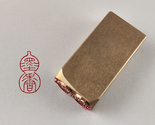
- 1*2*4cm Finished Brass Seal. Inscription:墨香 [mò xiāng]: The fragrance of ink
- 1 in stock
- Price negotiable
Get an item reminder
We'll email you a link to your item now and follow up with a single reminder (if you'd like one). That's it! No spam, no hassle.
Already have an account?
Log in and add this item to your wish list.



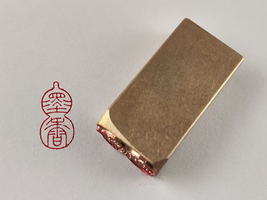
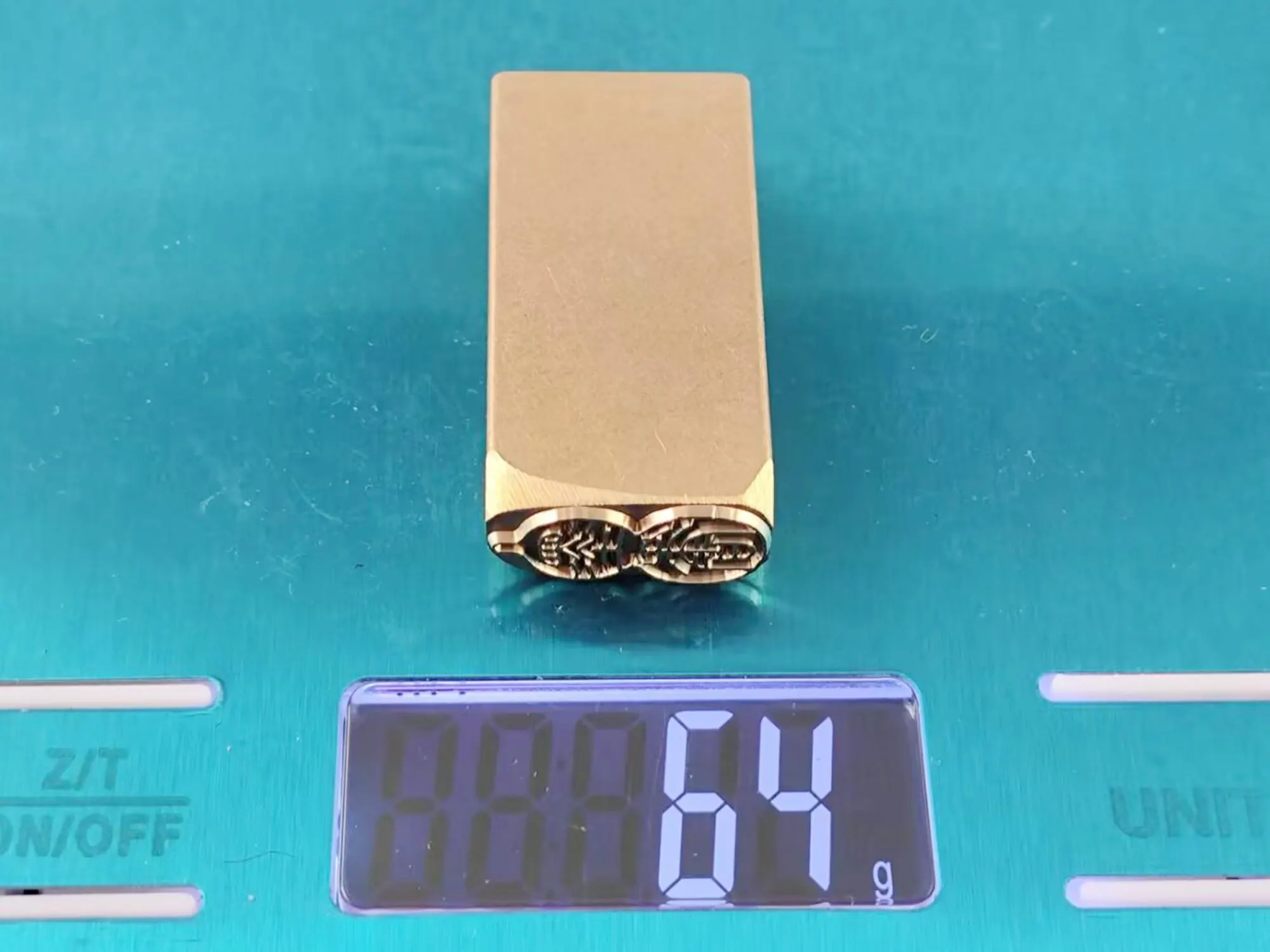
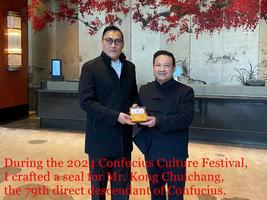
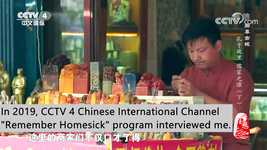
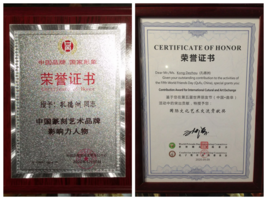
![1*2*4cm Finished Brass Seal. Inscription:墨香 [mò xiāng]: The fragrance of ink Item image 2](https://images-bucket.bonanzastatic.com/afu/images/cb3c/18a7/1416_15516232436/il_fullxfull.6669993184_eoaf.webp)
![1*2*4cm Finished Brass Seal. Inscription:墨香 [mò xiāng]: The fragrance of ink Item image 3](https://images-bucket.bonanzastatic.com/afu/images/3d4a/7f30/5082_15516233667/_____2025020615937.jpg)
![1*2*4cm Finished Brass Seal. Inscription:墨香 [mò xiāng]: The fragrance of ink Item image 4](https://images-bucket.bonanzastatic.com/afu/images/5f52/0030/9aea_15516233882/_____20250206215416.png)
![1*2*4cm Finished Brass Seal. Inscription:墨香 [mò xiāng]: The fragrance of ink Item image 5](https://images-bucket.bonanzastatic.com/afu/images/37a1/f7fd/7b2c_15516233916/_____20250213232825.png)